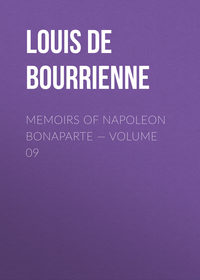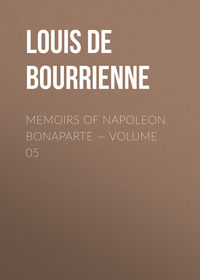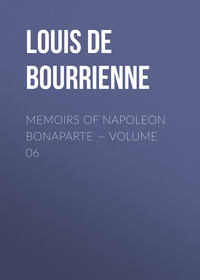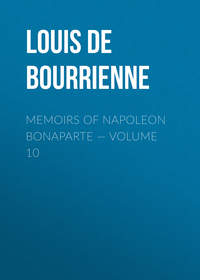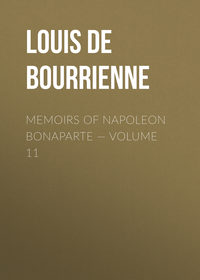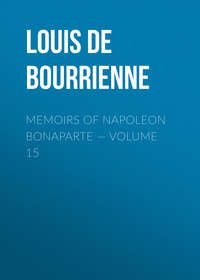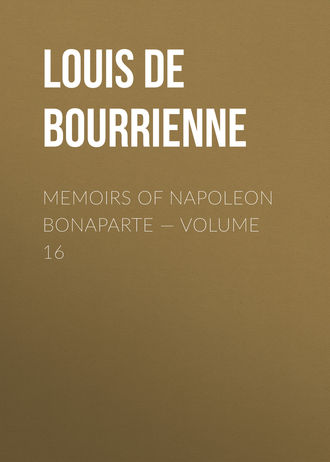 полная версия
полная версияMemoirs of Napoleon Bonaparte — Volume 16
Napoleon read a libel on himself, and contrasted the compliments which had passed between him and the Queen of Prussia with the brutal- behaviour ascribed to him in the English newspapers. On the other hand, two common sailors had at different times, while he was at Longwood and at the Briars, in spite of orders and at all risks, made their way through the sentinels to gain a sight of Napoleon. On seeing the interest they took in him he exclaimed, "This is fanaticism! Yes, imagination rules the world!"
The instructions of the English Ministers with regard to the treatment of Napoleon at St. Helena had been prepared with the view completely to secure his person. An English officer was to be constantly at his table. This order, however, was not carried into effect. An officer was also to accompany Napoleon in all his rides; this order was dispensed with within certain prescribed limits, because Napoleon had refused to ride at all on such conditions. Almost everyday brought with it some new cause of uneasiness and complaint. Sentinels were posted beneath Napoleon's windows and before his doors. This order was, however, doubtless given to prevent his being annoyed by impertinent curiosity. The French were certainly precluded from all free communication with the inhabitants of the island; but this precaution was of unquestionable necessity for the security of the Emperor's person. Las Cases complains that the passwords were perpetually changed, so that they lived in constant perplexity and apprehension of being subjected to some unforeseen insult. "Napoleon," he continues, "addressed a complaint to the Admiral, which obtained for him no redress. In the midst of these complaints the Admiral wished to introduce some ladies (who had arrived in the Doric) to Napoleon; but he declined, not approving this alternation of affronts and civilities." He, however, consented, at the request of their Colonel, to receive the officers of the 53d Regiment. After this officer took his leave. Napoleon prolonged his walk in the garden. He stopped awhile to look at a flower in one of the beds, and asked his companion if it was not a lily. It was indeed a magnificent one. The thought that he had in his mind was obvious. He then spoke of the number of times he had been wounded; and said it had been thought he had never met with these accidents from his having kept them secret as much as possible.'
It was near the end of December. One day, after a walk and a tumble in the mud, Bonaparte returned and found a packet of English newspapers, which the Grand-Marshal translated to him. This occupied him till late, and he forgot his dinner in discussing their contents. After dinner had been served Las Cases wished to continue the translation, but Napoleon would not suffer him to proceed, from consideration for the weak state of his eyes. "We must wait till to-morrow," said he. A few days afterwards the Admiral came in person to visit him, and the interview was an agreeable one. After some animated discussion it was arranged that Napoleon should henceforth ride freely about the island; that the officer should follow him only at a distance; and that visitors should be admitted to him, not with the permission of the Admiral as the Inspector of Longwood, but with that of the Grand-Marshal, who was to do the honours of the establishment. These concessions were, however, soon recalled. On the 30th of this month Piontkowsky, a Pole; who had been left behind, but whose entreaties prevailed upon the English Government, joined Bonaparte. On New-Year's Day all their little party was collected together, and Napoleon, entering into the feelings of the occasion, begged that they might breakfast and pass it together. Every day furnished some new trait of this kind.
On the 14th of April 1816 Sir Hudson Lowe, the new Governor, arrived at St. Helena. This epoch is important, as making the beginning of a continued series of accusations, and counter-accusations, by which the last five years of Napoleon's life were constantly occupied, to the great annoyance of himself and all connected with him, and possibly to the shortening of his own existence.
It would be tedious to detail the progress of this petty war, but, as a subject which has formed so great a portion of the life of Napoleon, it must not be omitted. To avoid anything which may appear like a bias against Napoleon, the details, unless when otherwise mentioned, will be derived from Las Cases, his devoted admirer.
On the first visit of the new Governor; which was the 16th of April, Napoleon refused to admit him, because he himself was ill, and also because the Governor had not asked beforehand for an audience. On the second visit the Governor, was admitted to an audience, and Napoleon seems to have taken a prejudice at first sight, as he remarked to his suite that the Governor was "hideous, and had a most ugly countenance," though he allowed he ought not to judge too hastily. The spirit of the party was shown by a remark made, that the first two days had been days of battle.
The Governor saw Napoleon again on the 30th April, and the interview was stormy. Napoleon argued with the Governor on the conduct of the Allies towards him, said they had no right to dispose of him, who was their equal and sometimes their master. He then declaimed on the eternal disgrace the English had inflicted on themselves by sending him to St. Helena; they wished to kill him by a lingering death: their conduct was worse than that of the Calabrians in shooting Murat. He talked of the cowardliness of suicide, complained of the small extent and horrid climate of St. Helena, and said it would be an act of kindness to deprive him of life at once. Sir H. Lowe said that a house of wood, fitted up with every possible accommodation, was then on its way from England for his use. Napoleon refused it at once, and exclaimed that it was not a house but an executioner and a coffin that he wanted; the house was a mockery, death would be a favour. A few minutes after Napoleon took up some reports of the campaigns of 1814, which lay on the table, and asked Sir H. Lowe if he had written them. Las Cases, after saying that the Governor replied in the affirmative, finishes his account of the interview, but according to O'Meara, Napoleon said they were full of folly and falsehood. The Governor, with a much milder reply than most men would have given, retired, and Napoleon harangued upon the sinister expression of his countenance, abused him in the coarsest manner, and made his servant throw a cup of coffee out of the window because it had stood a moment on a table near the Governor.
It was required that all persons who visited at Longwood or at Hut's Gate should make a report to the Governor, or to Sir Thomas Reade, of the conversations they had held with the French. Several additional sentinels were posted around Longwood House and grounds.
During some extremely wet and foggy weather Napoleon did not go out for several days. Messengers and letters continually succeeded one another from Plantation House. The Governor appeared anxious to see Napoleon, and was evidently distrustful, although the residents at Longwood were assured of his actual presence by the sound of his voice. He had some communications with Count Bertrand on the necessity that one of his officers should see Napoleon daily. He also went to Longwood frequently himself, and finally, after some difficulty, succeeded in obtaining an interview with Napoleon in his bedchamber, which lasted about a quarter of an hour. Some days before he sent for Mr. O'Meara, asked a variety of questions concerning the captive, walked round the house several times and before the windows, measuring and laying down the plan of a new ditch, which he said he would have dug in order to prevent the cattle from trespassing.
On the morning of the 5th of May Napoleon sent for his surgeon O'Meara to come to him. He was introduced into Napoleon's bed-chamber, a description of which is thus given: "It was about fourteen feet by twelve, and ten or eleven feet in height. The walls were lined with brown nankeen, bordered and edged with common green bordering paper, and destitute of skirting. Two small windows without pulleys, one of which was thrown up and fastened by a piece of notched wood, looked towards the camp of the 53d Regiment. There were window-curtains of white long- cloth, a small fire-place, a shabby grate and fire-irons to match, with a paltry mantelpiece of wood, painted white, upon which stood a small marble bust of his son. Above the mantelpiece hung the portrait of Maria Louisa, and four or five of young Napoleon, one of which was embroidered by the hands of his mother. A little more to the right hung also the portrait of the Empress Josephine; and to the left was suspended the alarm chamber-watch of Frederick the Great, obtained by Napoleon at Potsdam; while on the right the Consular watch, engraved with the cipher B, hung, by a chain of the plaited hair of Maria Louisa, from a pin stuck in the nankeen lining. In the right-hand corner was placed the little plain iron camp-bedstead, with green silk curtains, on which its master had reposed on the fields of Marengo and Austerlitz. Between the windows there was a chest of drawers, and a bookcase with green blinds stood on the left of the door leading to the next apartment. Four or five cane- bottomed chairs painted green were standing here and there about the. room. Before the back door there was a screen covered with nankeen, and between that and the fireplace an old-fashioned sofa covered with white long-cloth, on which Napoleon reclined, dressed in his white morning- gown, white loose trousers and stockings all in one, a chequered red handkerchief upon his head, and his shirt-collar open without a cravat. His sir was melancholy and troubled. Before him stood a little round table, with some books, at the foot of which lay in confusion upon the carpet a heap of those which he had already perused, and at the opposite side of the sofa was suspended Isabey's portrait of the Empress Maria Louisa, holding her son in her arms. In front of the fireplace stood Las Cases with his arms folded over his breast and some papers in one of his hands. Of all the former magnificence of the once mighty Emperor of France nothing remained but a superb wash-hand-stand containing a silver basin and water-jug of the same metal, in the lefthand corner." The object of Napoleon in sending for O'Meara on this occasion was to question him whether in their future intercourse he was to consider him in the light of a spy and a tool of the Governor or as his physician? The doctor gave a decided and satisfactory answer on this point.
"During the short interview that this Governor had with me in my bedchamber, one of the first things he proposed was to send you away," said Napoleon to O'Meara, "and that I should take his own surgeon in your place. This he repeated, and so earnest was he to gain his object that, though I gave him a flat refusal, when he was going out he turned about and again proposed it."
On the 11th a proclamation was issued by the Governor, "forbidding any persons on the island from sending letters to or receiving them from General Bonaparte or his suite, on pain of being immediately arrested and dealt with accordingly." Nothing escaped the vigilance of Sir Hudson Lowe. "The Governor," said Napoleon, "has just sent an invitation to Bertrand for General Bonaparte to come to Plantation House to meet Lady Moira. I told Bertrand to return no answer to it. If he really wanted me to see her he would have put Plantation House within the limits, but to send such an invitation, knowing I must go in charge of a guard if I wished to avail myself of it, was an insult."
Soon after came the Declaration of the Allies and the Acts of Parliament authorising the detention of Napoleon Bonaparte as a prisoner of war and disturber of the peace of Europe. Against the Bill, when brought into the House of Lords, there were two protests, those of Lord Holland and of the Duke of Sussex. These official documents did not tend to soothe the temper or raise the spirits of the French to endure their captivity.
In addition to the misery of his own captivity, Napoleon had to contend with the unmanageable humours of his own followers. As often happens with men in such circumstances, they sometimes disagreed among themselves, and part of their petulance and ill-temper fell upon their Chief. He took these little incidents deeply to heart. On one occasion he said in bitterness, "I know that I am fallen; but to feel this among you! I am aware that man is frequently unreasonable and susceptible of offence. Thus, when I am mistrustful of myself I ask, should I have been treated so at the Tuileries? This is my test."
A great deal of pains has been taken by Napoleon's adherents and others to blacken the character of Sir Hudson Lowe, and to make it appear that his sole object was to harass Napoleon and to make his life miserable. Now, although it may be questioned whether Sir Hudson Lowe was the proper person to be placed in the delicate situation of guard over the fallen Emperor, there is no doubt that quarrels and complaints began long before that officer reached the island; and the character of those complaints will show that at best the prisoners were persons very difficult to satisfy. Their detention at the Briars was one of the first causes of complaint. It was stated that the Emperor was very ill there, that he was confined "in a cage" with no attendance, that his suite was kept from him, and that he was deprived of exercise. A few pages farther in the journal of Las Cases we find the Emperor in good health, and as soon as it was announced that Longwood was ready to receive him, then it was urged that the gaolers wished to compel him to go against his will, that they desired to push their authority to the utmost, that the smell of the paint at Longwood was very disagreeable, etc. Napoleon himself was quite ready to go, and seemed much vexed when Count Bertrand and General Gourgaud arrived from Longwood with the intelligence that the place was as yet uninhabitable. His displeasure, however, was much more seriously excited by the appearance of Count Montholon with the information that all was ready at Longwood within a few minutes after receiving the contrary accounts from Bertrand and Gourgaud. He probably perceived that he was trifled with by his attendants, who endeavoured to make him believe that which suited their own convenience. We may also remark that the systematic opposition which was carried to such a great length against Sir Hudson Lowe had begun during the stay of Admiral Cockburn. His visits were refused; he was accused of caprice, arrogance, and impertinence, and he was nicknamed "the Shark" by Napoleon himself; his own calmness alone probably prevented more violent ebullitions.
The wooden house arrived at last, and the Governor waited on Napoleon to consult with him how and where it should be erected. Las Cases, who heard the dispute in an adjoining room, says that it was long and clamorous.
He gives the details in Napoleon's own words, and we have here the advantage of comparing his statement with the account transmitted by Sir Hudson Lowe to the British Government, dated 17th May 1816. The two accounts vary but little. Napoleon admits that he was thrown quite out of temper, that he received the Governor with his stormy countenance, looked furiously at him, and made no reply to his information of the arrival of the house but by a significant look. He told him that he wanted nothing, nor would receive anything at his hands; that he supposed he was to be put to death by poison or the sword; the poison would be difficult to administer, but he had the means of doing it with the sword. The sanctuary of his abode should not be violated, and the troops should not enter his house but by trampling on his corpse. He then alluded to an invitation sent to him by Sir Hudson Lows to meet Lady Loudon at his house, and said there could not be an act of more refined cruelty than inviting him to his table by the title of "General," to make him an object of ridicule or amusement to his guests. What right had he to call him "General" Bonaparte? He would not be deprived of his dignity by him, nor by any one in the world. He certainly should have condescended to visit Lady Loudon had she been within his limits, as he did not stand upon strict etiquette with a woman, but he should have deemed that he was conferring an honour upon her. He would not consider himself a prisoner of war, but was placed in his present position by the most horrible breach of trust. After a few more words he dismissed the Governor without once more alluding to the house which was the object of the visit. The fate of this unfortunate house may be mentioned here. It was erected after a great many disputes, but was unfortunately surrounded by a sunk fence and ornamental railing. This was immediately connected in Napoleon's mind with the idea of a fortification; it was impossible to remove the impression that the ditch and palisade were intended to secure his person. As soon as the objection was made known, Sir Hudson Lowe ordered the ground to be levelled and the rails taken away. But before this was quite completed Napoleon's health was too much destroyed to permit his removal, and the house was never occupied.
Napoleon seems to have felt that he had been too violent in his conduct. He admitted, when at table with his suite a few days after, that he had behaved very ill, and that in any other situation he should blush for what he had done. "I could have wished, for his sake," he said, "to see him evince a little anger, or pull the door violently after him when he went away." These few words let us into a good deal of Napoleon's character: he liked to intimidate, but his vehement language was received with a calmness and resolute forbearance to which he was quite unaccustomed, and he consequently grew more angry as his anger was less regarded.
The specimens here given of the disputes with Sir Hudson Lowe may probably suffice: a great many more are furnished by Las Cases, O'Meara, and other partisans of Napoleon, and even they always make him the aggressor. Napoleon himself in his cooler moments seemed to admit this; after the most violent quarrel with the Governor, that of the 18th of August 1816, which utterly put an end to anything like decent civility between the parties; he allowed that he had used the Governor very ill, that he repeatedly and purposely offended him, and that Sir Hudson Lowe had not in a single instance shown a want of respect, except perhaps that he retired too abruptly.
Great complaints were made of the scanty way in which the table of the exiles was supplied; and it was again and again alleged by them that they had scarcely anything to eat. The wine, too, was said to be execrable, so bad that in fact it could not be drunk; and, of such stuff as it was, only one bottle a day was allowed to each person—an allowance which Las Cases calls ridiculously small. Thus pressed, but partly for effect, Napoleon resolved to dispose of his plate in monthly proportions; and as he knew that some East India captains had offered as much as a hundred guineas for a single plate, in order to preserve a memorial of him, he determined that what was sold should be broken up, the arms erased, and no trace left which could show that they had ever been his. The only portions left uninjured were the little eagles with which some of the dish-covers were mounted. These last fragments were objects of veneration for the attendants of Napoleon they were looked upon as relics, with a feeling at once melancholy and religious. When the moment came for breaking up the plate Las Cases bears testimony to the painful emotions and real grief produced among the servants. They could not, without the utmost reluctance, bring themselves to apply the hammer to those objects of their veneration.
The island of St. Helena was regularly visited by East India ships on the return voyage, which touched there to take in water, and to leave gunpowder for the use of the garrison. On such occasions there were always persons anxious to pay a visit to the renowned captive. The regulation of those visits was calculated to protect Napoleon from being annoyed by the idle curiosity of strangers, to which he professed a great aversion. Such persons as wished to wait upon him were, in the first place, obliged to apply to the Governor, by whom their names were forwarded to Count Bertrand. This gentleman, as Grand-Marshal of the household, communicated the wishes of those persons to Napoleon, and in case of a favourable reply fixed the hour for an interview.
Those visitors whom Napoleon admitted were chiefly persons of rank and distinction, travellers from distant countries, or men who had distinguished themselves in the scientific world, and who could communicate interesting information in exchange for the gratification they received. Some of those persons who were admitted to interviews with him have published narratives of their conversation, and all agree in extolling the extreme grace, propriety, and appearance of benevolence manifested by Bonaparte while holding these levees. His questions were always put with great tact, and on some subject with which the person interrogated was well acquainted, so as to induce him to bring forth any new or curious information of which he might be possessed.
Captain Basil Hall, in August 1817, when in command of the Lyra, had an interview with the Emperor, of whom he says: "Bonaparte struck me as differing considerably from the pictures and busts' I had seen of him. His face and figure looked much broader and more square—larger, indeed, in every way than any representation I had met with. His corpulency, at this time universally reported to be excessive, was by no means remarkable. His flesh looked, on the contrary, firm and muscular. There was not the least trace of colour in his cheeks; in fact his skin was more like marble than ordinary flesh. Not the smallest trace of a wrinkle was discernible on his brow, nor an approach to a furrow on any part of his countenance. His health and spirits, judging from appearances, were excellent, though at this period it was generally believed in England that he was fast sinking under a complication of diseases, and that his spirits were entirely gone. His manner of speaking was rather slow than otherwise, and perfectly distinct; he waited with great patience and kindness for my answers to his questions, and a reference to Count Bertrand was necessary only once during the whole conversation. The brilliant and sometimes dazzling expression of his eye could not be overlooked. It was not, however, a permanent lustre, for it was only remarkable when he was excited by some point of particular interest. It is impossible to imagine an expression of more entire mildness, I may almost call it of benignity and kindness, than that which played over his features during the whole interview. If, therefore he were at this time out of health and in low spirits, his power of self-command must have been even more extraordinary than is generally supposed, for his whole deportment, his conversation, and the expression of his countenance indicated a frame in perfect health and a mind at ease."
The manner assumed by Napoleon in the occasional interviews he had with such visitors was so very opposite to that which he constantly maintained towards the authorities in whose custody he was placed, that we can scarcely doubt he was acting a part in one of those situations. It was suggested by Mr. Ellis that he either wished, by means of his continual complaints, to keep alive his interest in England, where he flattered himself there was a party favourable to him, or that his troubled mind found an occupation in the annoyance which he caused to the Governor. Every attempt at conciliation on the part of Sir Hudson Lowe furnished fresh causes for irritation. He sent fowling-pieces to Longwood, and the thanks returned were a reply from Napoleon that it was an insult to send fowling-pieces where there was no game. An invitation to a ball was resented vehemently, and descanted upon by the French party as a great offence. Sir Hudson Lowe at one time sent a variety of clothes and other articles received from England which he imagined might be useful at Longwood. Great offence was taken at this; they were treated, they said, like paupers; the articles, ought to have been left at the Governor's house, and a list sent respectfully to the household, stating that such things were at their command if they wanted them.


